My resolution this year was to make more videos — or honestly, to make any video at all. So I wrote a script, hit record, and ended up with a bunch of footage I wasn’t quite sure what to do with.
I had questions. Lots of them. How do you add captions so everyone can follow along? What even is b-roll? And are video editors really as complicated as they look?
Enter AI: It’s already helping me work smarter in other areas. I decided to do what I do best — start experimenting. I set out to test a bunch of tools in search of the best AI video editors of 2025.
Most AI video editors now come with a pretty standard toolkit: they’ll clean up background noise, cut out filler words like “um” and “uh,” remove long silences, generate captions, and let you remove the background entirely if you want.
They even act as AI video makers and can use text-to-video capabilities to create complete videos with just a prompt.
Where things get interesting is when you look at which one of these AI video editors does these basic edits the best, what else these tools can do and, more importantly, which ones are worth using depending on the kind of video you’re making.
Here’s a breakdown of the best AI video editors right now, based on what they do especially well.
Best AI video editors:
- 1. Adobe Premiere Pro — Best for editors working on complex or long-form projects
- 2. Canva — Best for social media videos that blend simple editing with rich design options
- 3. CapCut — Best for flexible, fuss-free desktop and mobile editing
- 4. Clipchamp — Best for anyone getting started with video editing
- 5. DaVinci Resolve — Best for advanced projects that need full creative control
- 6. Descript — Best for podcasts, interviews, and other dialogue-heavy videos
- 7. Final Cut Pro — Best for high-end projects that need advanced visual effects
- 8. Kapwing — Best for editing at speed without sacrificing features
- 9. Opus Clip — Best for turning longer videos into short, shareable clips
- 10. Veed — Best all-in-one editor for long-form videos without a learning curve
- 11.Wondershare Filmora — Best for creators who want more control without the complexity
- Bonus - Adobe Podcast — Best for getting crystal-clear audio for your videos
- Does AI video generation play a role in the editing process?
- AI video editing fits around you
1. Adobe Premiere Pro
Best for editors working on complex or long-form projects
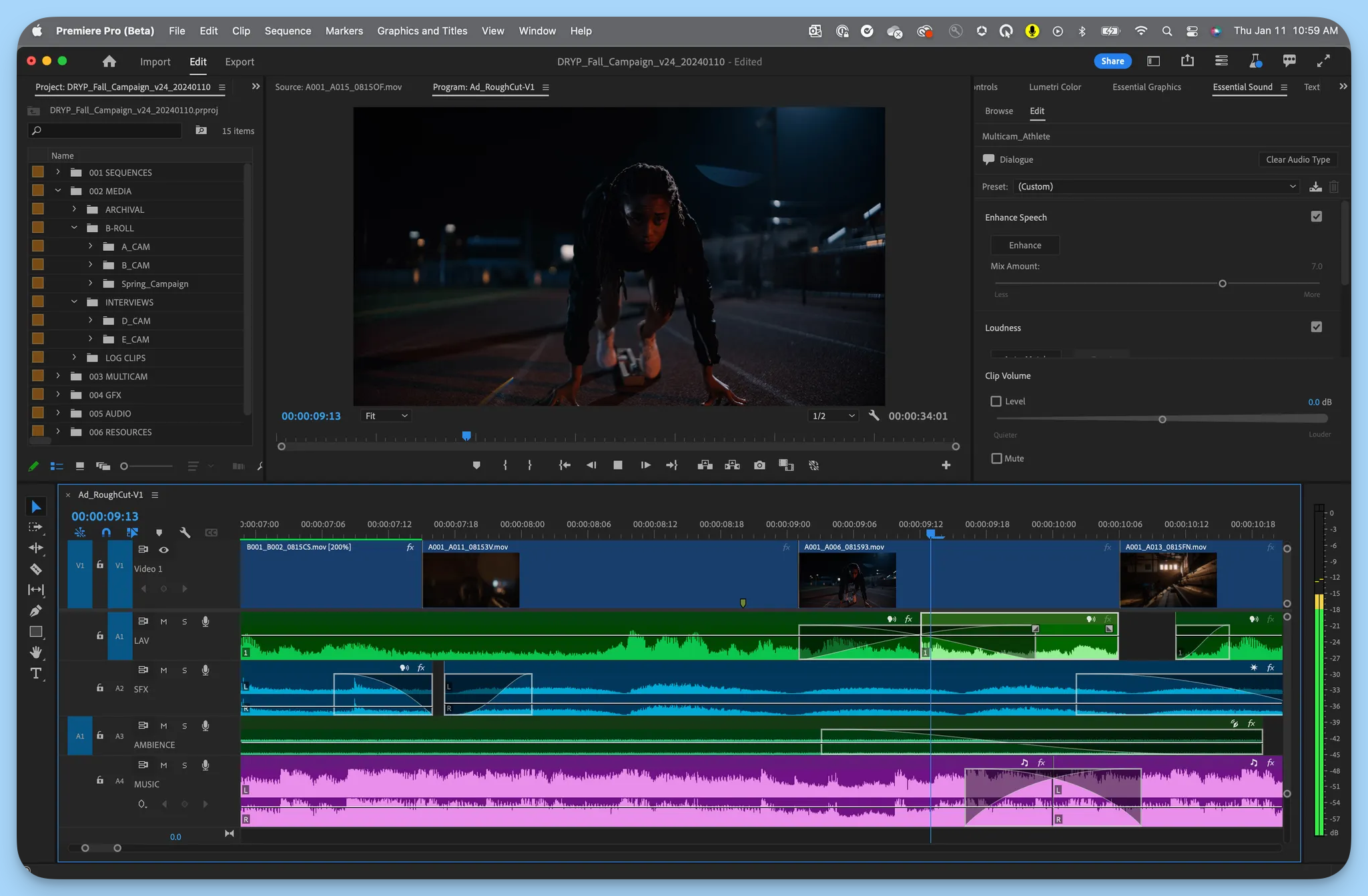
Adobe Premiere Pro is filled with pro-level tools that hand you plenty of creative control but also a bit more to learn along the way.
An AI-powered feature that stands out is Morph Cut, which really shines when you’ve trimmed filler words or awkward pauses from an interview or talking head video. Instead of leaving behind a hard, obvious cut, Morph Cut blends the clips so they play like one continuous take, as if the camera never stopped rolling.
And while almost every tool in this list can reframe horizontal videos into 9:16 for social, Premiere Pro goes a step further with its AI Reframe tool. It automatically finds the subject in your shot and tracks their movement so the final video stays focused on the action.
If video editing is a regular part of your week (or you’re working on something big), Premiere Pro is probably worth the time to learn and investment. For quick trims or casual clips, though, it might be more than you need.
Price: On its own, it’s $34.99 per month paid monthly ($37.99 per person for teams), also available as a bundle with the rest of Adobe’s 20+ creative tools
2. Canva
Best for social media videos that blend simple editing with rich design options
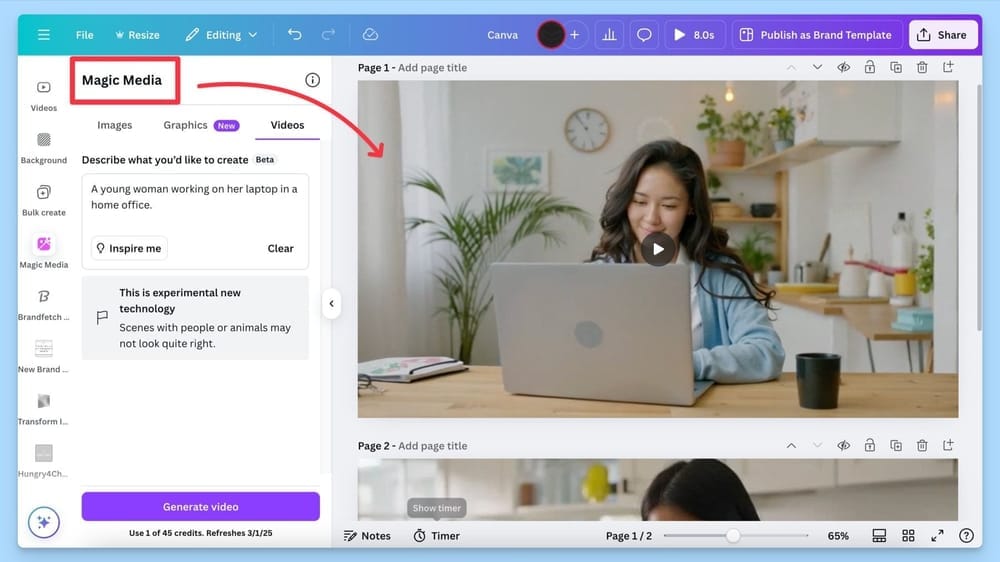
What can’t Canva do? Its massive library of elements and integrations makes it easy to create almost any kind of social video — whether that’s a quick TikTok, an eye-catching Instagram Reel, or a polished promo.
One standout feature is Magic Design — part AI video generator, part AI video editor. It quickly creates videos from up to 10 of your photos or video clips and a text-to-video prompt. You get a first draft complete with smart captions, transitions, animations, and even background music.
Of course, you’re not locked into Canva’s music. If you’d rather use trending audio or your own voiceover, you can download videos — with all the text, transitions, and animations — then add your audio in TikTok or Instagram.
On the flip side, Canva is slightly limiting if your videos rely heavily on speech or dialogue. While it can generate automatic captions, it doesn’t support script-based editing. Deleting a word from the transcript will only remove the caption, not the actual footage.
If you’re working with speech-heavy videos like interviews or talking-head videos, there are some great AI-powered video editors coming up that are built for exactly this.
Price: Free plan with limited AI features, Pro plans start at $15 per month paid monthly ($10 per person for teams)
3. CapCut
Best for flexible, fuss-free desktop and mobile editing

No roundup of AI video editing software would be complete without CapCut. TikTok’s official video editor is lightweight, easy to use, and packs in a lot of power in both its desktop and mobile apps.
Like most video editors, CapCut includes tools to clean up background noise and enhance your audio, and it goes a step further with Isolate Voice. You can use this AI feature to separate vocals from the music in a song, so you’re left with either the vocals or just the instrumental — whatever best fits your project.
It’s smart to skip this feature for tracks from major labels, since copyright rules can be tricky. The good news: there are plenty of royalty-free or licensed music options out there that let you experiment without worry.
Price: Free plan, with Pro plans starting at $5.99 per month paid monthly for mobile only, and $19.99 per month paid monthly for mobile, desktop, and web ($24.99 per person for teams)
4. Clipchamp
Best for anyone getting started with video editing
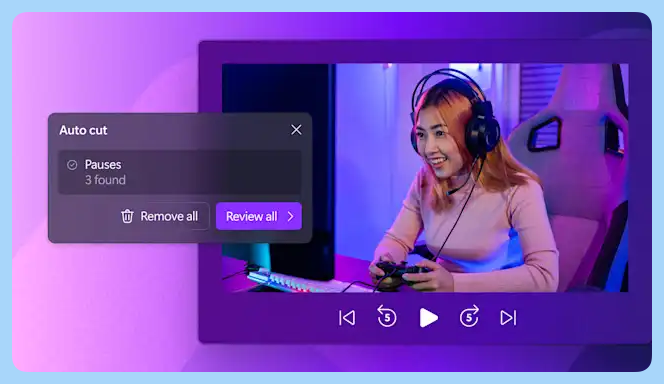
If you’re new to video editing, Microsoft’s Clipchamp is one of the easiest ways to dive in. It comes with tons of ready-made templates and without a steep learning curve.
Clipchamp’s AI video tools are fairly simple: background noise suppression, removing silences, text-to-speech, auto transcription and captions, and background removal.
Where it shines is with its generous free plan. Clipchamp is the only video editor in this list that lets you use all these AI features for free — and export your videos without a watermark. That’s a rare find!
For anyone just starting out, it offers a lot without asking for much in return. Paid plans add extras like premium stock assets, higher resolution exports for better video quality, and a brand kit to help you keep your videos on-brand as you grow.
Price: Free plan with all AI features included, Premium plan starts at $11.99 per month paid monthly. It’s also included in many Microsoft plans, including those for businesses.
5. DaVinci Resolve
Best for advanced projects that need full creative control
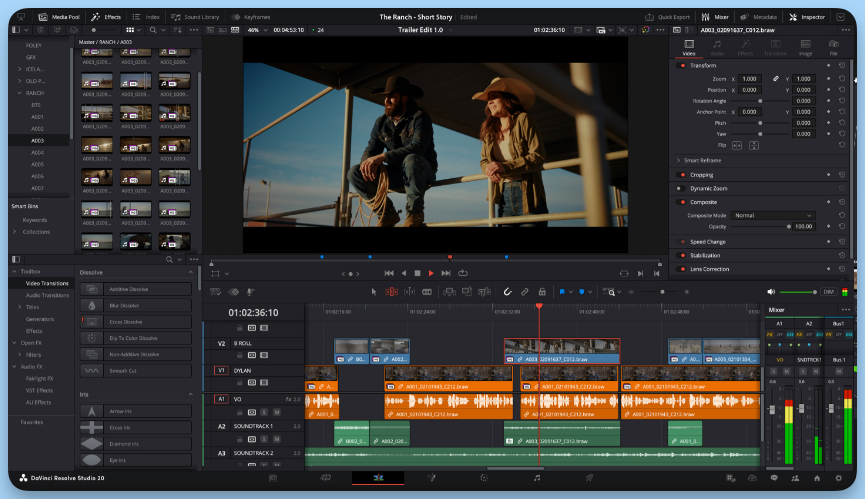
Like Adobe Premiere Pro, DaVinci Resolve is a longtime favorite among professional editors, especially for projects that need a polished, cinematic finish. Two of its most impressive AI tools are Music Remixer and Relight.
Music Remixer lets you isolate the individual elements in a song — vocals, bass, guitar, drums. You can adjust the volume of each one separately, mute specific instruments, or solo a single track to create the exact mix you want. Want only the bassline? Done. Need everything but the drums? That works too. You can build a mix that fits your video perfectly.
Relight is a powerful AI tool to adjust the lighting in your shot. If you’ve ever finished shooting and wished the lighting were different, Relight lets you fix it after the fact. You can add a virtual light source to your footage to change the light’s direction, adjust shadows, or completely shift the mood of a scene without having to reshoot.
The free version of DaVinci Resolve includes plenty of pro-level features, so it’s a solid place to start if you’re still learning the ropes. When you’re ready to take things further, you can upgrade to the Studio version to access tools like Music Remixer and Relight. No subscriptions here — the paid version is a one-time purchase.
Price: Free version available with an extensive feature set, DaVinci Resolve Studio is a one-time payment of $295
6. Descript
Best for podcasts, interviews, and other dialogue-heavy videos

Descript is built for speech-first content like podcasts, interviews, webinars, and explainer videos — and it shows.
While most AI video editors now offer script-based editing, Descript’s entire workflow is built around the transcript. You can remove words or phrases from the transcript, and Descript will cut them out of the video itself. Plus, you can even add new scenes and mark chapters just as if you’re marking up a document. These are its basic AI-powered tools.
Then there are the advanced ones. If you’ve recorded a take multiple times to get it right (who among us hasn’t?), Remove Retakes is an incredible time saver. It scans your video, automatically identifies the best take, and cuts the rest. There’s no damage done if you don’t like its choice — you can easily pick another one instead, right from the transcript.
And for anyone recording interviews or podcasts, Automatic Multicam takes footage from multiple cameras and automatically creates a professional, dynamic cut that switches between speakers at the right moments.
Descript also has an AI agent co-editor called Underlord you can summon at any time to make specific changes, walk you through how to do something, or even just give you feedback on your video's script. It’s still in beta, so results can be a little unpredictable, but it showed a lot of promise in my tests.
While you could technically edit a video without dialogue in Descript, you wouldn’t be able to use it to its full power. If your main goal is creating visual-first content for TikToks or Instagram Reels, one of the other tools on this list might be a better fit.
Price: Free plan with limited features, pro plans start at $24 per month paid monthly ($35 per person for teams)
7. Final Cut Pro
Best for high-end projects that need advanced visual effects
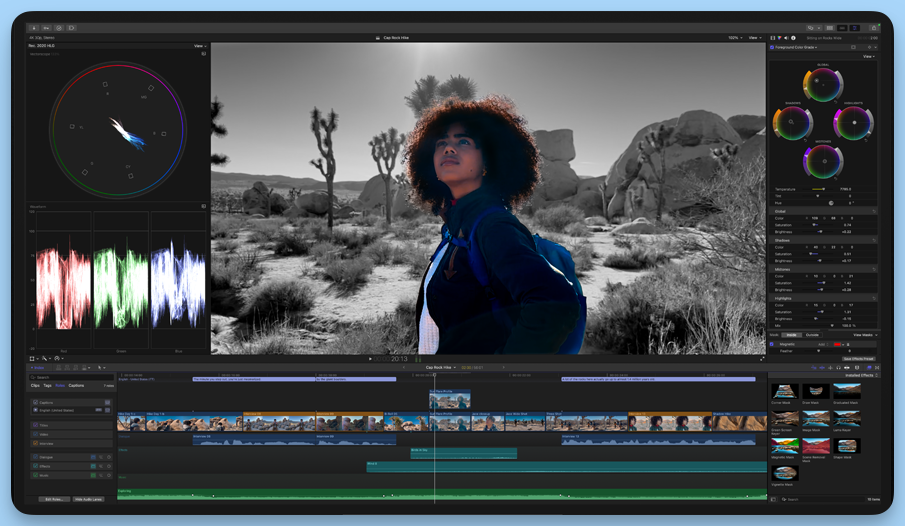
Final Cut Pro is the final (pun intended) heavyweight AI video editor on this list, and a longtime favorite among professional editors. It’s available only on Mac and comes packed with high-performance tools for high-production video.
Its most impressive AI feature is Magnetic Mask, which can separate a moving subject from the background, even if that subject is in motion. Unlike standard background removal tools built for static shots or talking heads, this one works on full-body movement, so you can create layered effects that interact with your footage more dynamically.
That opens up all kinds of creative possibilities. One simple use is adding text that stays fixed in the background, so as someone walks through the frame, it looks like they’re passing in front of it. Or, you could use it to keep your subject in color while the rest of the scene appears in black and white.
You could also take it up a notch. If you’re a travel creator, you could create a transition where you walk into the frame in Rome and step out of it in Seoul in one smooth motion.
It’s the kind of layered, cinematic effect that usually requires frame-by-frame masking. Here, a single AI tool handles these more complex scenes and effects.
Final Cut Pro is a paid video editor built for professionals, but if you’re on a Mac and want to push your edits further, it’s more than up to the task.
Price: $299.99 to own, with a free trial if you’d like to test it out before you commit
8. Kapwing
Best for editing at speed without sacrificing features
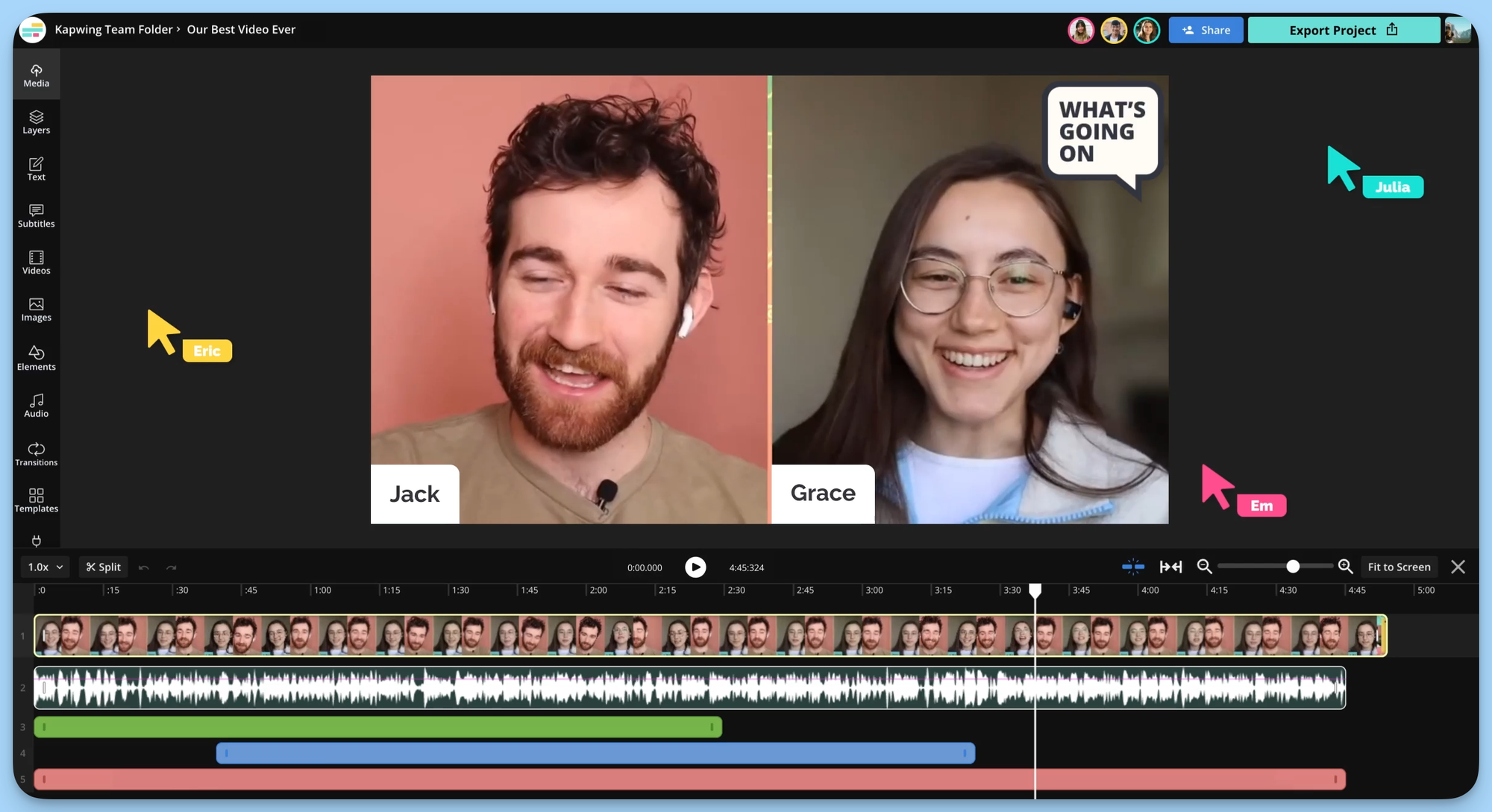
Kapwing does just about everything you’d expect from an AI video editor, and it does a solid job across the board. But when it comes to speed, Kapwing is in a league of its own.
Of all the video editors I tested, this one was hands-down the fastest. Every part of the process — uploading, transcribing, editing and styling captions, adding overlays, working with audio — was blazing fast.
Even AI tools like dubbing and lip sync responded quickly. There were fewer clicks, shorter load times, and no noticeable lag.
That might not seem like a big deal, but video files can get heavy and unwieldy. If you spend long hours editing video, this level of speed will make you wonder how you managed without it.
Price: Free plan with limitations, Pro plans start at $24 per month paid monthly for individuals and teams
9. Opus Clip
Best for turning longer videos into short, shareable clips
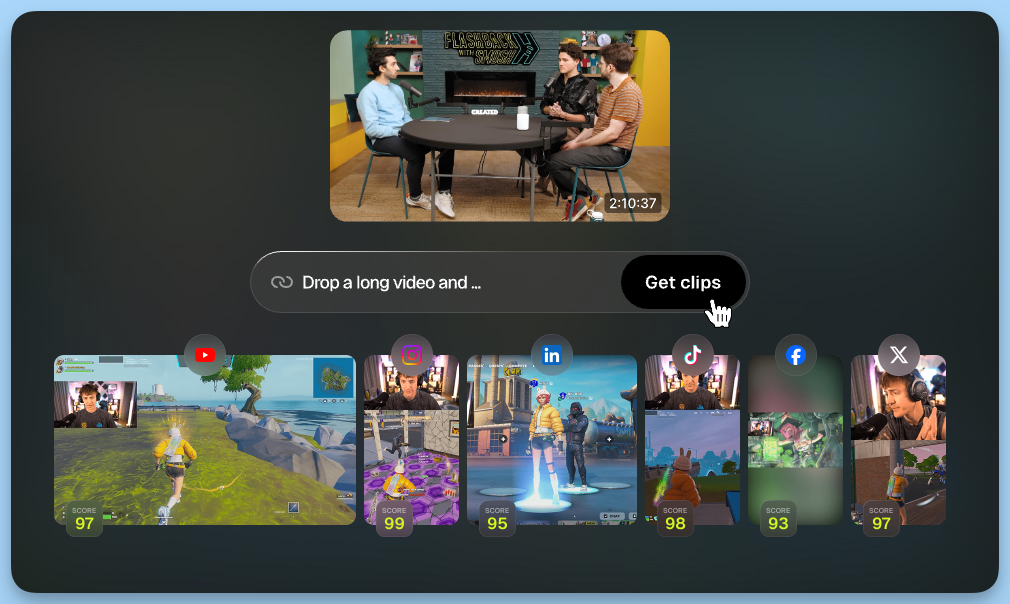
If you’re repurposing videos for social media platforms, Opus Clip is built for exactly that. It analyzes your video, pulls out the most engaging moments, and turns them into ready-to-post clips, complete with hooks and customizable captions.
I put this to the test with one of Buffer’s six-minute YouTube videos, and Opus Clip quickly delivered six polished, 30-second clips. These clips are ready to post out of the gate.
But if you’d rather finesse them, you can open each one in a full-featured editor and tweak everything: change caption styles, trim filler words, add transitions, add b-roll — all the usual video editing features.
It also includes a handy auto-censor tool that can mute or bleep words that might limit your video’s reach (and flag it in the captions, too).
Opus Clip also gives each clip a “viral score” — a rating that estimates how well it’s likely to perform on TikTok, Instagram Reels, or YouTube Shorts based on factors like the hook, pacing, and structure. I trimmed a few words from the beginning of a clip and saw the hook score jump from a B to an A-. Definitely felt like I aced a test!
If a big part of your video marketing strategy involves repurposing content for different platforms, Opus Clip saves time and is a powerful tool to have in your corner.
Price: Free trial, plans start at $15 per month billed monthly ($29 per person for teams)
10. Veed
Best all-in-one editor for long-form videos without a learning curve
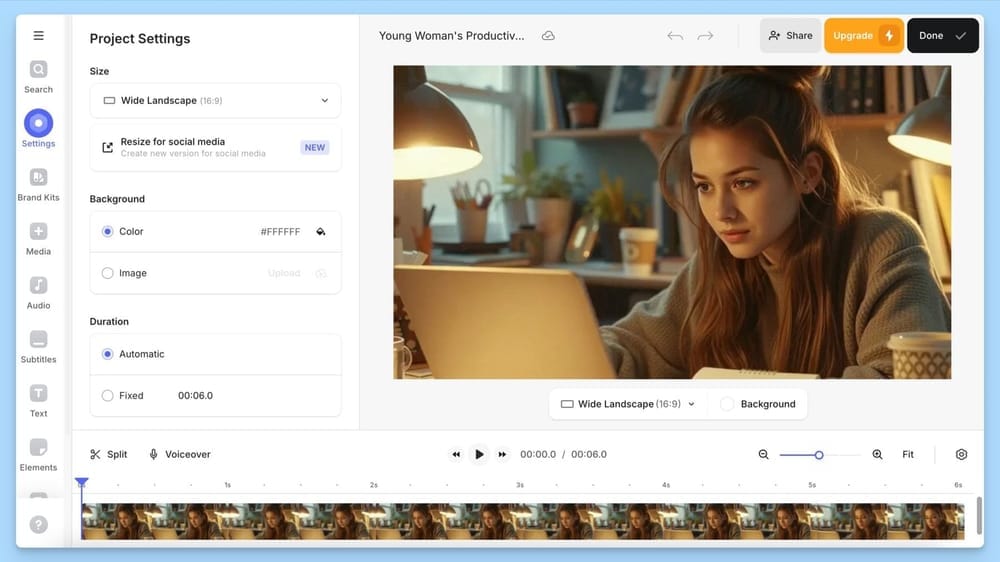
Veed is a powerful, full-featured editor that handles everything from long-form to social media videos, but what’s most impressive is how easy it is to get up and running. It’s packed with features yet never feels overwhelming — and a lot of its AI-powered tools are genuinely impressive.
The automatic transcription was easily the most accurate of all the video editors I tested. It picked up my words perfectly, even with my Indian accent.
From there, caption generation was quick and fully customizable, with plenty of styling options to match your platform or brand. Veed’s subtitle generation was also impressive — it quickly translated my captions into French, giving me the same customization options to choose from.
Another highlight is Eye Contact, which subtly adjusts your gaze so you’re always looking at the camera, even if you’re reading off a script. It works surprisingly well, especially for talking head videos or intros where you need direct eye contact.
Veed also has an incredibly practical (non-AI) feature for social media creators — safe zones for social media videos. When you’re working on a clip for TikTok, Instagram Reels, or YouTube Shorts, Veed shows you where the platform's interface elements — like the username, caption, and like buttons — will appear. This lets you place your text and graphics perfectly so nothing important gets covered up.
If you want a platform that’s fast, accurate, and covers everything from transcription to edits, Veed delivers.
Price: Free plan with limitations, paid plans start at $24 per month billed monthly for individuals and teams
11. Wondershare Filmora
Best for creators who want more control without the complexity
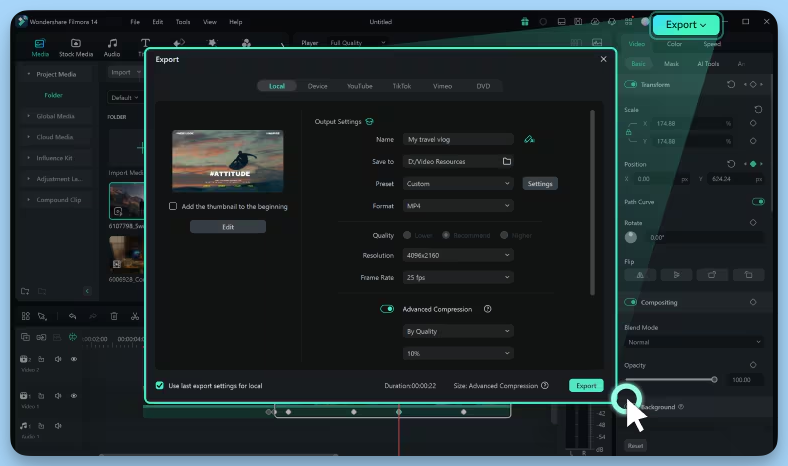
Wondershare Filmora is a great choice if you want to make your videos pop with eye-catching effects but don’t want the learning curve that comes with a pro-level editing suite.
Its Beat Detection feature lets you time your video cuts to land perfectly on the beat of a song. Just add a track, and Filmora will automatically mark each beat on the timeline. You can then adjust each video clip to match the song's rhythm. It’s especially handy for trailers, social edits, or anything where timing matters.
Motion Tracking is another pretty cool AI tool for adding creative video effects. If something in your video is moving — like a car driving by — you can attach another element to it. Filmora will make sure that element follows along as the object moves. Think: a thought bubble that follows someone as they’re walking, or your video’s title driving off screen on a car.
And if you record your audio and video separately — say, with an external microphone for better sound quality— the Auto Synchronization feature will be a welcome sight. It automatically lines up your files so that the audio and video are perfectly synced and the video editing process is smoother.
Price: Free plan without AI tools, paid AI plans start at $79.99 per year for MacOS, iOS, and iPadOS and $59.99 for Windows and Android ($155.88 per person paid annually for teams)
Bonus: Adobe Podcast
Best for getting crystal-clear audio for your videos
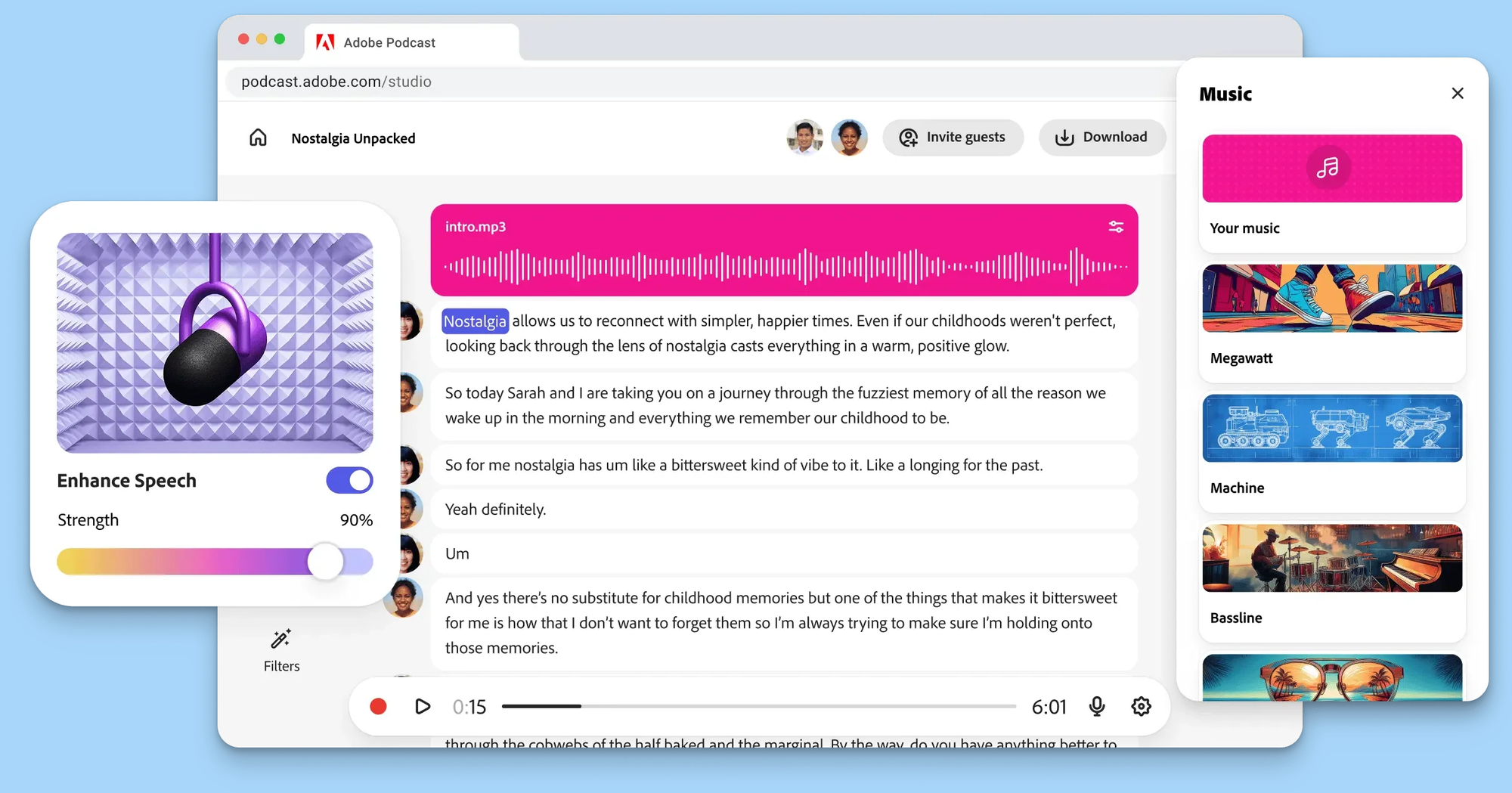
Adobe Podcast is a brand-new AI editor — I even got a message saying “Thanks for being one of the first to try Adobe Podcast,” when I signed up.
It’s a bonus mention here because it isn’t a full AI video editor — Adobe Podcast’s sole job is to give you brilliantly clear audio in your videos.
The process is simple. You upload a video file, and the AI transcribes it for you. You can tweak the transcript to make cuts, and then run it through its audio enhancement tools.
I tested out the tool with a particularly noisy recording shot on my phone — no professional microphone in sight — and the results were incredible. It removed all the background sound, leaving my voice crisp and clear with very little distortion.
It also has a couple of other handy audio tools. You can record audio directly in the app (great for voiceovers you can bring over to your video editing tool), and there’s even a mic check feature that tells you whether to bring your mic closer or further away before you hit record.
Adobe Podcast doesn’t pretend to be a full video editor. There are no captions, no b-roll, and no options for adding music. But if great audio is your priority, this tool knocks it out of the park.
It’s so good, I’m seriously considering making it a permanent step in my workflow: shoot the video, clean up the audio in Adobe Podcast, and then bring it into a video editor for everything else.
Price: Free plan with audio support only, paid plans with video support start at $9.99 per month paid monthly. If you have another Adobe product, you may get this one bundled in.
Does AI video generation play a role in the editing process?
While this guide focused mostly on editing, many of the tools above also include AI video generation features that can help you move faster in creating videos.
You’ll find features like AI avatars and voiceovers that can narrate your script for you, AI-generated b-roll that creates overlays, and even AI animators that can turn a static image into a video clip.
Some of these tools go even further, with a powerful text-to-video AI video generator — you just type a prompt and hit generate. This gives you a solid video that you can then take into the editor to polish and perfect, which can be a huge boost to your creative process.
Each tool has its own strengths, combining its editing features with its AI video creation tools helps you automate the initial setup, letting you jump straight to the creative edits that make your video stand out.
AI video editing fits around you
The best part about these AI video editors is that, no matter your experience level, there’s something here for you. You can lean on the AI features for a faster workflow, or take more control and fine-tune much of the raw video yourself — there’s really no right or wrong way to edit videos.
However much — or little — you rely on the AI features, there’s no denying AI video editors free you up to focus on the creative decisions only you can make. They make video creation more accessible to everyone, which is a pretty great thing.
Another plus: there’s a helpful YouTube tutorial for almost anything you want to try. If you’re ever stuck or curious about a new trick, chances are someone’s already made a step-by-step video.
If your favorite video editor didn’t make this list, I’d love to hear about it. Please comment below or tag @buffer or @bufferapp on all major social channels, and I’ll give it a spin.
And if you’re looking to take even more off your plate, you can use Buffer to plan and schedule all your videos, whether they’re YouTube Shorts, Instagram Reels, or TikToks, and even generate captions to go along with them.
Try Buffer for free
190,000+ creators, small businesses, and marketers use Buffer to grow their audiences every month.




